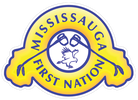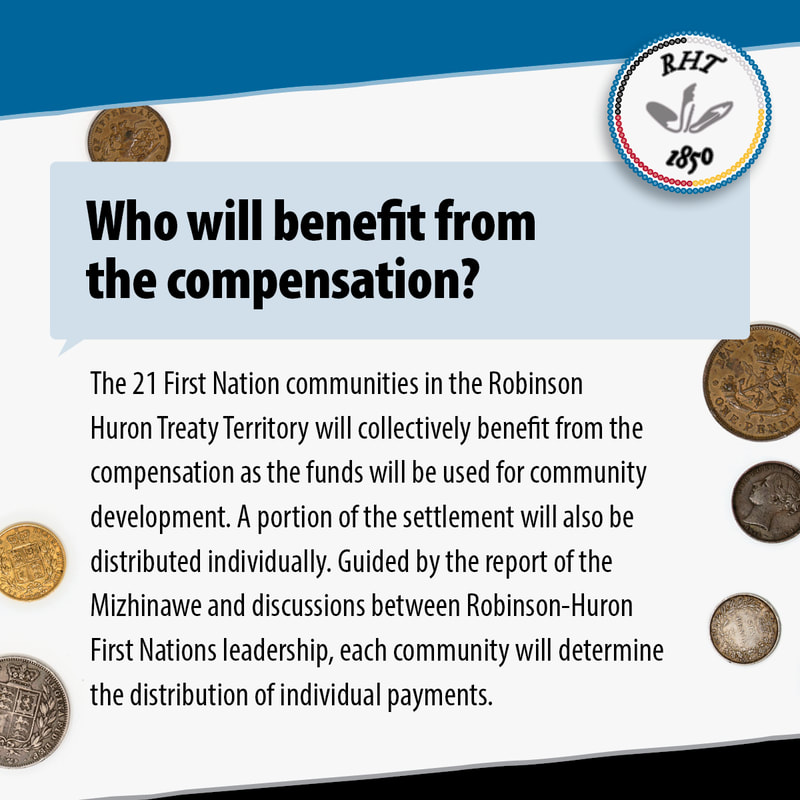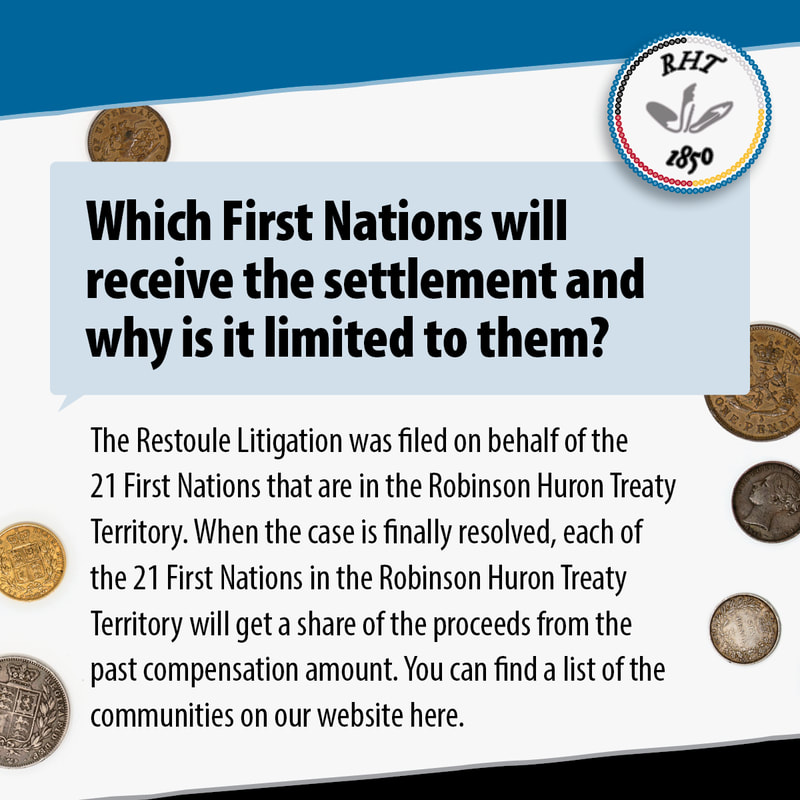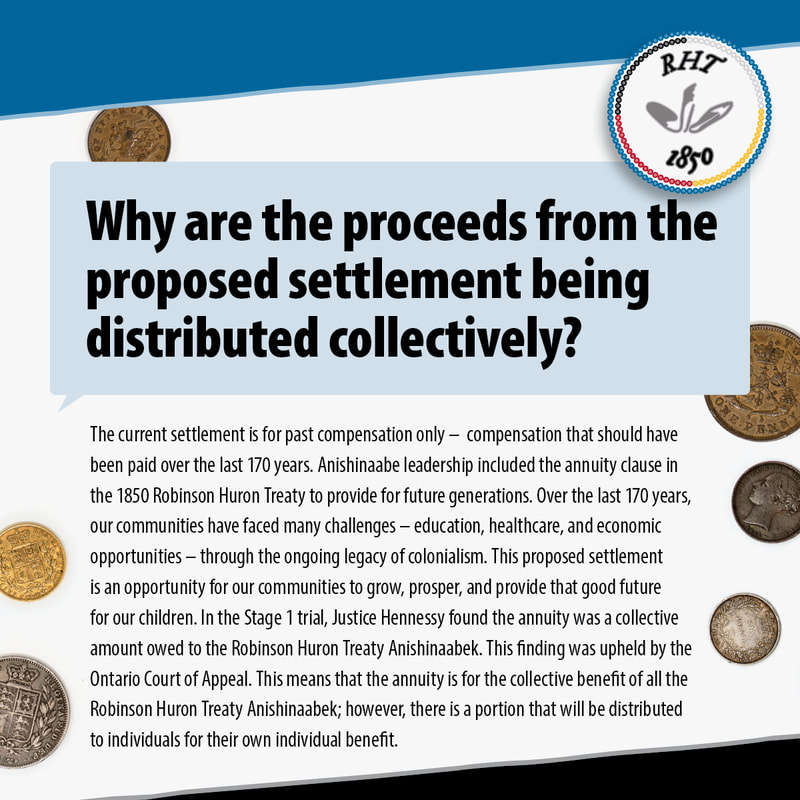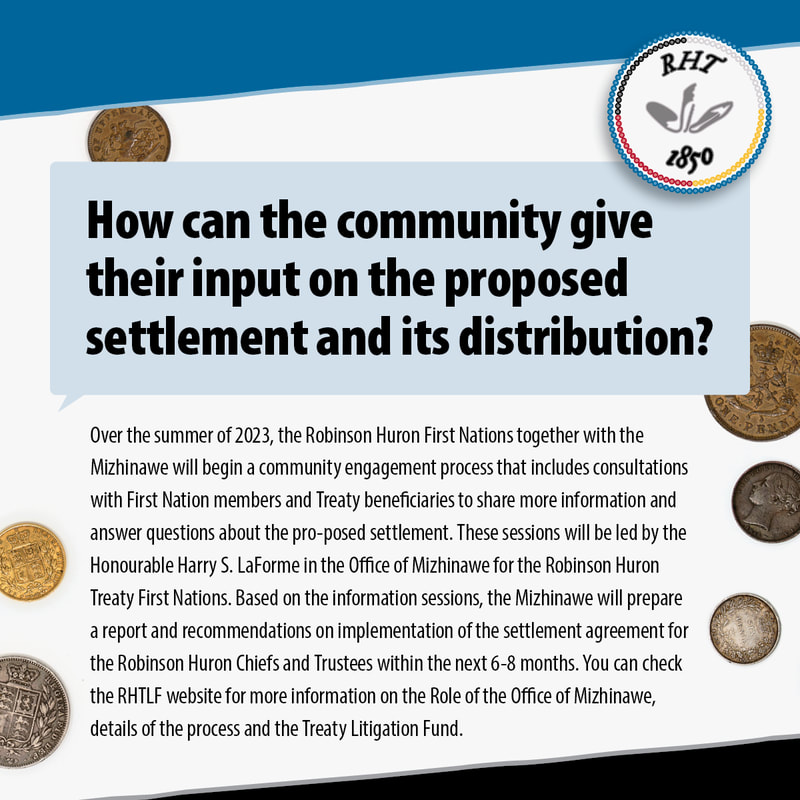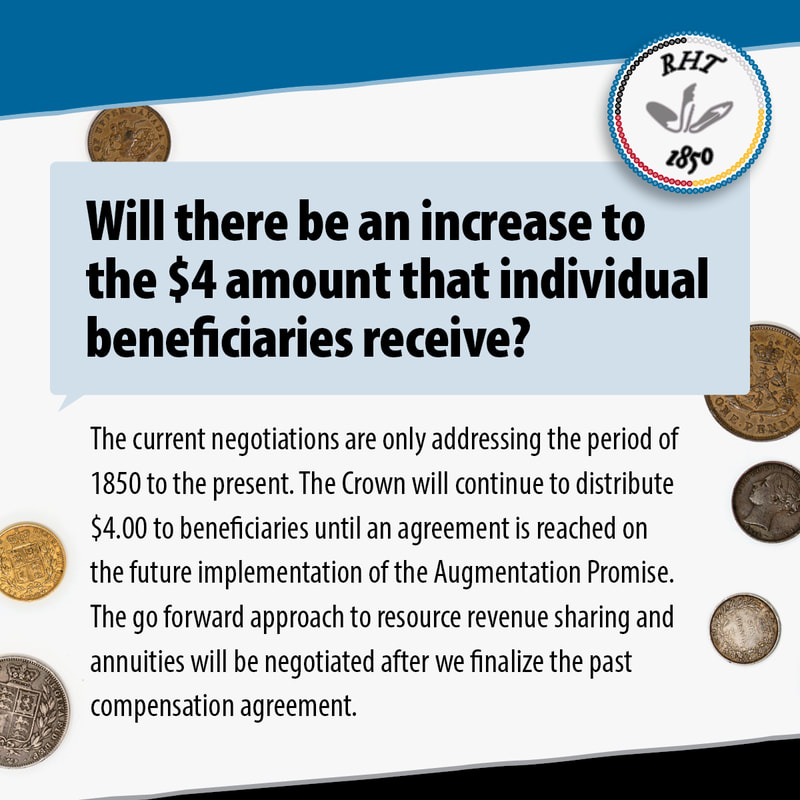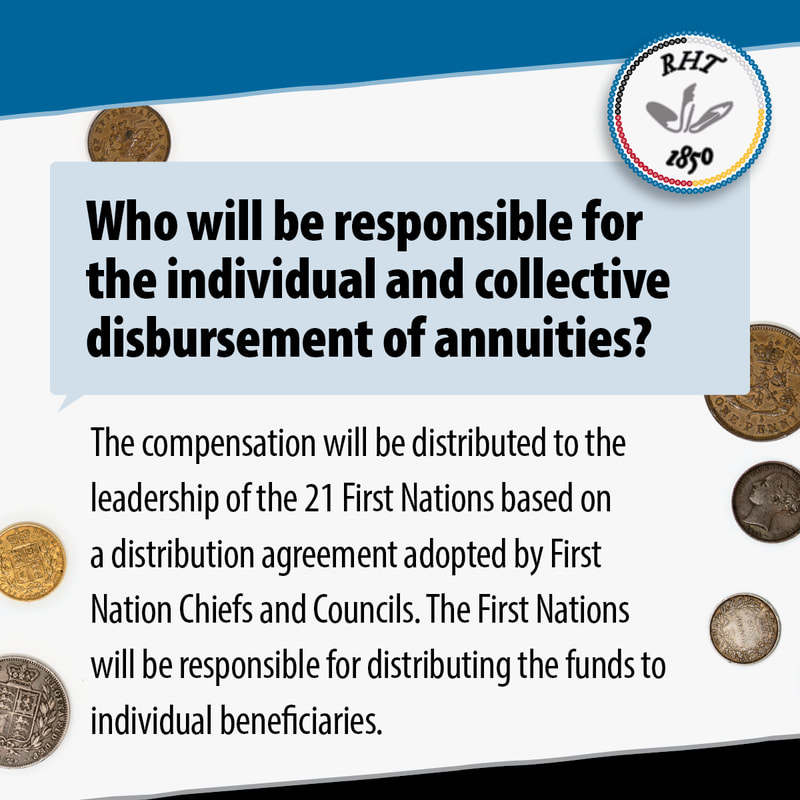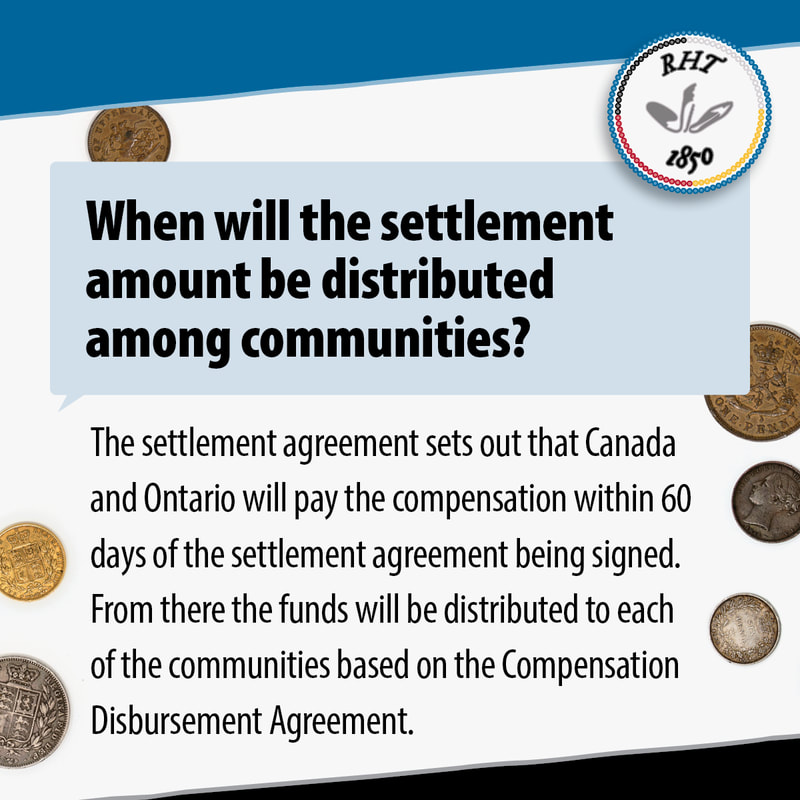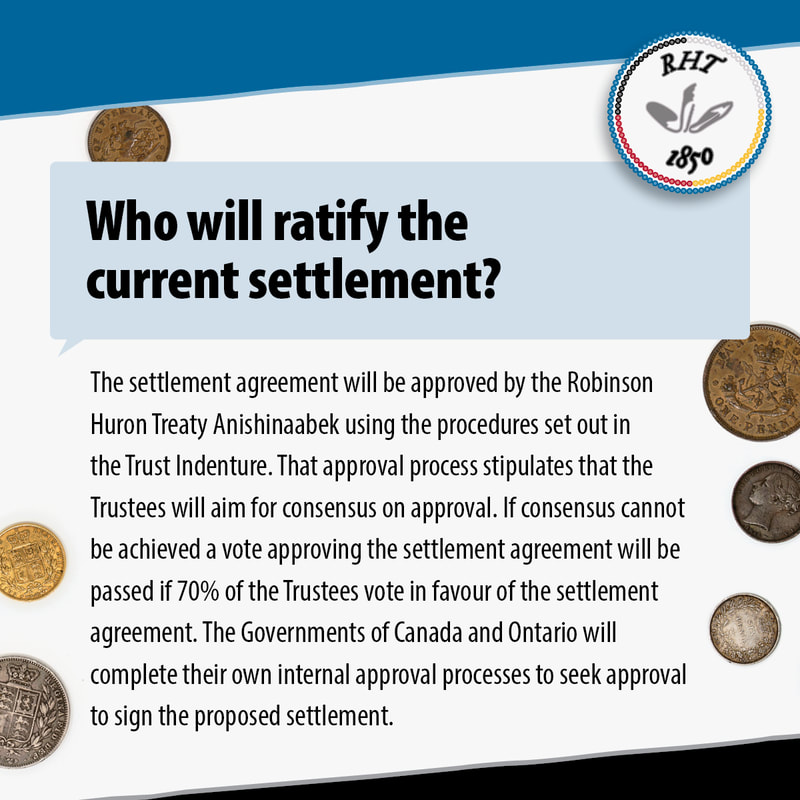|
Robinson Huron Treaty Annuities Case
Updates: (Please click on image to enlarge) As stewards of our ancestral lands and guardians of our heritage, the Mississauga First Nation holds a deep connection to the Robinson-Huron Treaty territory. This page aims to provide our community members and visitors with comprehensive information on the ongoing litigation concerning the Robinson-Huron Treaty.
For the most current updates and developments regarding the Robinson Huron Treaty Litigation Fund, please visit the Robinson Huron Treaty Litigation website or our Facebook page. Our History and Treaty Rights: The Robinson-Huron Treaty, signed in 1850, is a cornerstone of our relationship with the Canadian government. It reflects our ancestors' vision and sacrifices to secure our rights and ensure the protection of our lands, waters, and resources. This treaty is not just a historical document; it is a living agreement that continues to shape our community's present and future. The Litigation Journey: The litigation around the Robinson-Huron Treaty addresses long-standing issues regarding treaty rights and obligations. Our fight is not only for the recognition and respect of the treaty's terms but also for the broader recognition of our inherent rights as a First Nation. This legal challenge represents our commitment to justice, respect, and the preservation of our way of life. What is the annuity?
The annuity is a collective entitlement of the Robinson Huron Anishinaabek, having originally been set at “six hundred pounds of good and lawful money of Upper Canada” (approximately $2,400). However, there is an individual component to the collective annuity. In fact, from 1850-1854 the annuity was paid to the Chiefs and it was the Chiefs’ responsibility to distribute any amounts to their citizens. In Stage 1 of the Robinson Huron Treaty case, Justice Hennessy found the reference to $4 per person in the Treaty text “is a limit only on the amount that may be distributed to individuals, and this distributive amount is a portion of the collective lump sum annuity payable to the Chiefs and their Tribes.” When will a new annuity amount be determined?
A new annuity amount will not be determined until the case is finally resolved, either through litigation or negotiations. When the case is finally resolved, each of the 21 First Nations will get a share of the proceeds from past compensation. This includes compensation that should have been paid to our ancestors over the last 170 years. The Leadership recognizes the individual component to the annuity and will distribute some amount to individuals which has not been determined. However, the collective nature of the annuity requires portions to be set aside for the collectivity and to ensure community development and a bright future for the generations to come. What is the process for dispersing the annuity payments?
Disbursement of proceeds to the 21 First Nations from the legal action are subject to a distribution agreement adopted by First Nation Chiefs and Councils. When will the case be settled?
The litigation is ongoing; however, the parties have agreed to adjourn the Stage 3 trial to focus on reaching a negotiated resolution. Ontario has also appealed the Stage 1 decision to the Supreme Court of Canada and that appeal will be heard in the fall of 2023. It is our hope the case will be settled in the near future. Why are the negotiations confidential?
Prior to commencing negotiations with Canada and Ontario, the parties entered into a Negotiations Protocol Agreement. This agreement requires all discussions at negotiations be kept confidential. The confidentiality of the negotiations allows the parties to speak frankly to one another without fear that statements will be made publicly. Once an agreement is reached with the Crown, information will be shared with the community. about the robinson huron treaty of 1850
The Robinson-Huron Treaty of 1850, is a painful chapter in our history, one filled with broken promises and lost lands. It was a time when our people faced immense challenges as European settlers encroached upon our traditional territories. For generations, we had lived harmoniously on the lands stretching across the eastern shores. These lands held deep spiritual and cultural significance for us, and we cherished our connection to them. However, the British Crown, represented by William Benjamin Robinson, sought to secure these lands for the settlers' benefit. In the face of tremendous pressure, our Chiefs and leaders reluctantly entered into negotiations with Robinson. We agreed to surrender our lands, hoping that in return, our people would receive fair treatment and protection. The treaty promised annuity payments, which were meant to provide ongoing support for our communities, education for our children, and assistance in agriculture and health care. But the promises made to us were not fulfilled. The annuity payments were meager and inconsistent, leaving our people to face economic hardships and struggle to maintain our traditional way of life. Our lands were taken from us, and we were left to bear the burden of displacement and the loss of our cultural heritage. The treaty acknowledged our right to hunt and fish on our surrendered territories, but even those rights have been challenged and restricted over the years. Our ability to sustain ourselves through traditional practices has been further eroded. The Robinson-Huron Treaty stands as a painful reminder of the injustices inflicted upon us. It is a testament to the enduring struggle faced by Indigenous peoples in asserting our rights and preserving our way of life in the face of colonization. Today, we continue to fight for the proper implementation of the treaty's provisions, seeking justice and recognition for the injustices that have been done. We strive to reclaim our lands, revive our cultural practices, and ensure a brighter future for our children. The Robinson-Huron Treaty serves as a solemn reminder of the importance of upholding treaty rights and fostering genuine reconciliation between Indigenous peoples and the Canadian government. It is a call to honor the promises made, rectify past wrongs, and forge a path of true partnership and respect between our nations. |
LINKS
Robinson Treaties | Government of Canada Historical Background | Government of Canada RHT Treaty of 1850 | Litigation Website RHT Gathering Information - Sept. 7-9, 2023 RESOURCES
Update Your Contact Information CONTACT INFORMATION
Debbie Mayer, RHT Coordinator [email protected] 705-356-1621 ext. 2263 705-261-0823 Robinson Huron Treaty Trust 1 Miigizi Mikan P.O Box 711 Nipissing First Nation P1B 8J8 [email protected] LOCATION
64 Park Road PO BOX 1299 Mississauga First Nation, ON P0R 1B0 Phone: 705-356-1621 Fax: 705-261-1441 Toll Free: 1-877-356-1621 |
